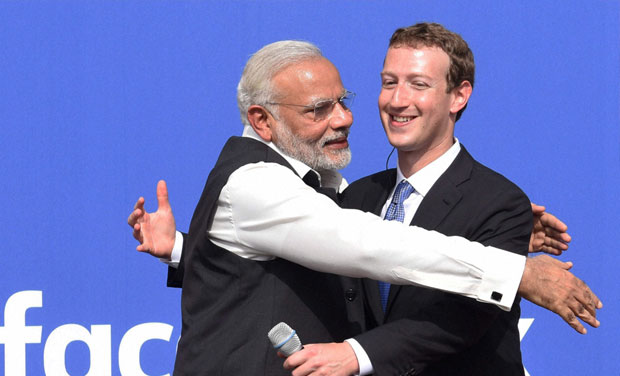
Source: Deccan Chronicle (September 25, 2015)
Neocolonial Intimacies



On September 27, 2015, Indian Prime Minister Narendra Modi participated in a Townhall Q&A event at Facebook, timed to coincide with the launch of his country’s Digital India campaign earlier that year. Digital India aims to connect India’s billion, mostly rural, citizens to internet infrastructure and thus deliver government services while promoting digital literacy. For Facebook CEO Mark Zuckerberg, the launch of this policy initiative created an opportunity to offer Free Basics – a zero-rated mobile data service targeted toward developing countries that offers free internet access to certain websites – to Indians in a gesture of corporate social responsibility. In addition to threats to net neutrality posed by Free Basics’ free access to a curated selection of primarily commercial websites, including Facebook, the requirement of a Facebook login to use the service is perhaps an even more pressing concern. Free Basics is just one example of how Facebook’s appeals to global connectivity legitimize its own colonization of users through the systematic harvesting of personal data.
Zuckerberg’s recent framing of Facebook as the social infrastructure to connect the world in a “global community” might thus be understood through the lens of neocolonialism. Neocolonialism posits that the economic, and therefore political, system of a state can be directed from outside. Kwame Nkrumah, first president of an independent Ghana and key figure in African decolonization, posited that neocolonialism hinges on foreign capital as a mechanism “for the exploitation rather than for the development of the less developed parts of the world,” which “increases rather than decreases the gap between the rich and the poor countries of the world” (1965, p. x). While such flows of capital and ideology are complex and not necessarily unidirectional in contemporary modes of neocolonialism (Appaduarai 1990), power nonetheless renders certain flows more frictionless than others.
In relation to the development paradigms underpinning global communications infrastructure, increasing privatization under neoliberal regimes has been examined as a form of neocolonialism. In the context of telecommunications privatization in the 1990s, Jean-Pierre Chamoux (1997) argued that despite some commonalities with colonial rent-seeking arrangements, the fact that companies acted in consortia, for their own profit interest and not for their home country, and in a communications market not characterized by scarcity meant that neocolonialism was a suggestive but not entirely appropriate term to describe commercial development in Asian, South American, or Eastern European contexts. However, in the case of Free Basics, where a single company (Facebook) would exercise an effective monopoly through local mobile operators while also acting in the interest of a specifically Californian ideology (Barbrook & Cameron 1996), a case for the neocolonial contours of this version of development becomes stronger.
At the moment of the photograph, in September 2015, the neocolonial aura of Free Basics’s foray into India was in fact at the heart of its net neutrality controversy. Earlier that year, the Telecom Regulatory Authority of India (TRAI) held public consultations on differential pricing for data services, which resulted in an outpouring of pro-net neutrality public comments and an expert report recommending that TRAI uphold net neutrality principles even in the context of development rationales. Facebook’s response to this growing opposition in India was to reinforce its ideological position about bringing “the most disadvantaged people in society” into its global community through a blog post by Zuckerberg and full-scale advertising campaign, both in traditional media and on Facebook itself, oriented around an empowerment narrative (Gurumurthy & Chami 2016). This noble goal is undercut by the subsequent finding that Free Basics running on a smartphone is an inadequate mechanism for getting rural people online in areas that lack internet cables and Wi-Fi towers; rather, the program’s main impact has been to get people already using the internet to switch to free data within the closed ecosystem of Facebook’s selection of commercial websites offered through Free Basics as a “confined space” in contrast to the open internet (Biddle 2017). The eventual failure of Facebook’s efforts to move TRAI into a ruling more favourable to Free Basics prompted one of its board members to retort that “anti-colonialism has been economically catastrophic for the Indian people for decades. Why stop now?” (quoted in Taplin 2017, p. 144). Revealing how Facebook sees its own remit as colonial, this statement supports a reading of the apparent social responsibility gesture of Free Basics, wrapped in neoliberal appeals to consumer empowerment, as thin cover for a neocolonial project.
The attempt to integrate rural Indians into Facebook’s version of consumerist empowerment through an infrastructure dominated by Silicon Valley tech culture represents an iteration of neocolonialism predicated on longstanding expansionist models for rendering othered bodies as useful under capitalism (Mbembe 1992). The way Facebook does this – by acquiring ever more users, for which it has to extend beyond the Global North as it is “running out of humans on the planet” (Martínez 2016, p. 375) – ultimately serves the expansion of its own surveillance capital apparatus (Shepherd 2015). The rural Indians who should be welcoming the empowerment provided by Free Basics are of course mainly valuable to Facebook for their data. This personal data, often hailed as the new currency (e.g., Gates & Matthews 2014), feeds into capitalist projects such as the ever more granular and predictive targeting of ads, the training of artificial intelligence, and the growing monopoly status of technology giants like Facebook as they build an infrastructure of authoritarianism.
Perhaps the political implications of Facebook’s global connectivity project most directly dovetail with Modi’s likely interests in joining this fray. Elected in 2014, Modi’s Bharatiya Janata Party campaigned on an ethnoreligious Hindu nationalism representing the country’s Right-wing, if not far-Right, ideology. Modi himself had been the chief minister of the state of Gujarat and was best known for his role in supporting the 2002 mass violence against Muslims in the state (Chakravartty & Roy 2015, pp. 311-312). The way that Modi’s leadership campaign rectified his reputation as the “butcher of Gujarat” was through the cultivation of a mediated populism on social media, positioned diametrically against the mainstream press. Since becoming Prime Minister, Modi has taken the further step of intervening in the provision of web content, by temporarily blocking certain websites for example, in an attempt to clear the record of his own actions and politics: “This has had the effect of tearing the commercialized national media between two poles: either it turns attention elsewhere, or it remains fixed on his individual person” (Ohm 2015, p. 373).
Modi’s individual person is constructed partly through his signature bear hug, depicted in the photograph. His penchant for invading foreign leaders’ personal space, through what’s been termed “bear-hug diplomacy” (Thomas 2017; Deccan Chronicle 2015), feeds into Modi’s negotiation of masculinity in relation to Hindu nationalism. Sanjay Srivastava (2015) has characterized “Modi-masculinity” against the colonial feminization of non-European men and within the context of contemporary global consumerism: “Modi-masculinity’s peculiar characteristic lies in its judicious presentation of Indian manhood as both deeply national (and hence territorialized) as well as global (and de-territorialized)” (Srivastava 2015, p. 335). The bear hug thus actualizes Modi’s neocolonial politics in performing both a nationalist masculinity and a neoliberal openness to an ethic of global consumption and enterprise.
The significance of Modi embracing Zuckerberg is that the diplomatic gesture positions Zuckerberg among the leaders of nation-states as a public and political figure. Rebecca MacKinnon (2012) has argued that large social media platforms like Facebook – which reached two billion monthly active users in June 2017 – carry out essential governance functions that supersede national borders; specifically, Facebook enacts “a Hobbesian approach to governance in which people agree to relinquish a certain amount of freedom to a benevolent sovereign who in turn provides security and other services” (p. 164). Increasingly self-conscious about his political role, Zuckerberg frames his expanding dominion through the language of global community, over which he rules as a benevolent dictator. The way that Facebook among other tech companies has reconfigured public space through its development of a massive social infrastructure is evident in the way that the 2015 meeting between Modi and Zuckerberg occurred at a Facebook “Townhall” amid the promotion of Free Basics on the Facebook platform. As Facebook’s power over public speech has become more apparent, its practices have come under increasing regulatory scrutiny, hence the need to forge alliances with governments – particularly governments of former colonial states where Facebook sees the potential to capitalize from the acquisition of billions of new users in return for neocolonial deals with repressive regimes (Mozur et al. 2017).
Despite Zuckerberg’s attempts at such backdoor diplomacy, the hug with Modi evidences the uneasiness of Facebook’s neocolonial alliances in its awkwardness. Here, Modi’s generally “awkward physicality” is met by Zuckerberg’s “microexpressions” of discomfort, evident in his forced smile (Taylor 2016; Thomas 2017). Both figures appear stiff, flanked by the signifiers of the modern public relations apparatus, from the Facebook-blue backdrop to the audience toward which they gaze rather than looking at each other. The hug is, literally and figuratively, staged. As a performative gesture, the failure of the hug to enact a convincing intimacy signals the uneasiness of the neocolonial relationship between Facebook and India. To borrow from Eva Illouz (2007), there is a “cold intimacy” at work here where the saturation of late capitalism by emotion generates ironic disjunctures in the neocolonial arrangement. While Facebook’s dominion over a global mediascape has been generally capable of reproducing the fetishism of its own cultural production and consumption (Appadurai 1990), in the case of Free Basics in India, Zuckerberg’s attempt to co-opt a position of state power came up against the limitations of its own sovereignty.
Ultimately, the photograph offers up a repetition of colonial relationships that perhaps unwittingly shows the intrinsic failure of colonialism at the level of the body. This body is both the physical bodies of Modi and Zuckerberg, stiffly posed in mid-embrace, and the body that this moment constructs, a neocolonial alliance between Facebook – acting as a state – and India. In this moment, it is the awkward emotional valence that most urgently beckons the viewer of the photograph to consider how, in Sara Ahmed’s (2014) terms, “emotions create the very effect of the surfaces and boundaries that allow us to distinguish an inside and an outside in the first place” (p. 10). The effect created by the discomfort depicted in the photo suggests boundaries between states that are based on a long, uncomfortable history of the West’s colonial attitude toward India in particular.
Returning to the role of masculinity in that history, the hug, as a “bear hug,” is not only an instance of Modi-masculinity being reinforced by media representation, it is also a visualization of the uneasy alliance between Modi-masculinity and Zuck-masculinity. Within the hierarchies of masculinity that have been instrumental to the colonial project (Patil 2009), Zuck-masculinity achieves the conquest imperatives of exploration, discovery, and penetration not through military might but through the surreptitious construction of value from data, data harvested from bodies as emotional, as containers for tastes, preferences and reactions. As its counterpart, Modi-masculinity “combines the continuing imperatives of longstanding power structures and relations of deference, with newer political economies of neoliberalism” (Srivastatva 2015, p. 336). And the photograph shows this deference by the colonized to a Western colonizer that rules through the exploitation of marginalized bodies who are made useful through datafied commodification. Yet the combination of the two comes across as forced, as uncomfortable, flagging the uneasy affect that swirls around Facebook’s status as a global power that, in being challenged by the net neutrality advocates instrumental to TRAI’s ruling against Free Basics for example, is increasingly being held to account.
----------
References
